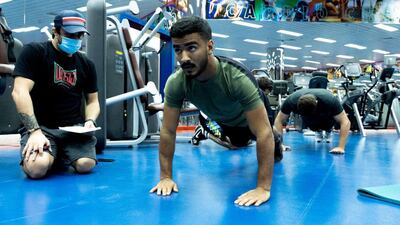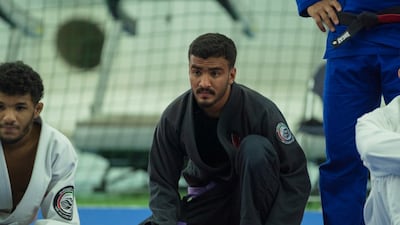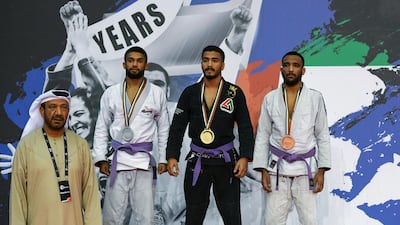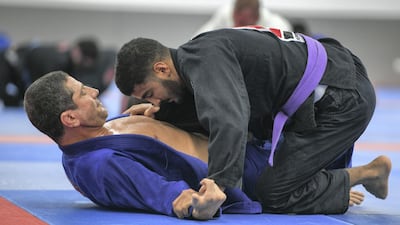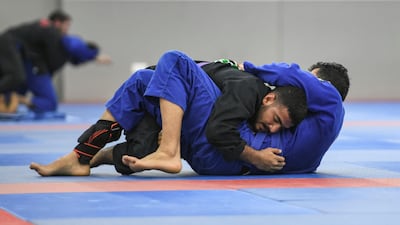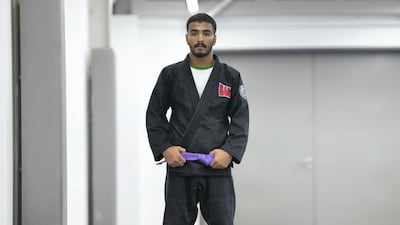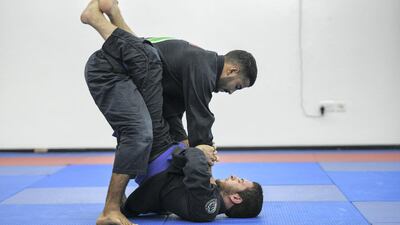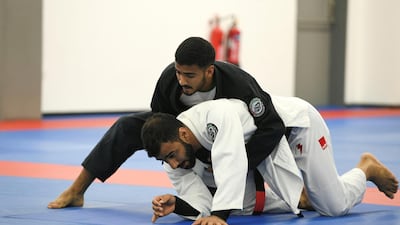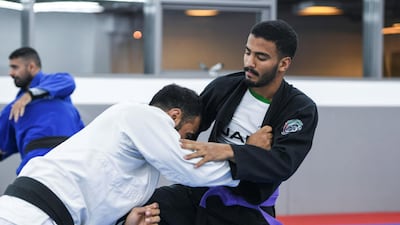Emirati jiu-jitsu fighter Hamad Nawad is focusing on his training as he tries to move forward from the coronavirus pandemic.
Nawad was the gold medallist at the 2018 Jakarta Asian Games. Having spent more than three years preparing for that moment at the continental showpiece in the 56kg category, Nawad then took an 18-month break to complete his high school exams.
He was successful with 86.6 per cent marks and, combined with his jiu-jitsu, earned a scholarship for a four-year undergraduate course in Information Technology on Security and Forensics at the Higher Colleges of Technology in Abu Dhabi.
After fulfilling the promise he made to his mother of achieving good grades in his studies, Nawad, 19, returned to the mat to win gold at Grand Slam Abu Dhabi in January.
He proclaimed 2020 as his comeback year until everything changed with the outbreak of Covid-19.
"Winning gold at Grand Slam Abu Dhabi, I thought, was the perfect start for me but Covid-19 gave us a surprise," Nawad told The National during the UAE high performance squad's three-week training camp at the Armed Forces Officers Club in Abu Dhabi.
“We have already completed two weeks [in training] and then we’ll be given a break for Eid at the end of the final week. We don’t know what the federation’s plans are thereafter.”
Nawad is among 45 participants at the high performance camp being held by the UAE Jiu-Jitsu Federation – under strict guidelines of the medical authorities – since March.
“It’s a resident camp behind closed doors,” Nawad said. “Our federation, as always, looked after our welfare and provided us the best training facilities under the prevailing circumstances.
“We have been working really hard, and believe me, if we go into a competition with this kind of training, we can surprise a lot of our opponents.”
Nawad said they train twice a day from 5-6pm and 9.30pm-12.30am while observing fast during the holy month of Ramadan.
“Fasting and training isn’t a hindrance for any Muslim,” he said.
“We practice it from a very young age and it is easily adaptable. My jiu-jitsu training has also helped in controlling my diet and weight at 56kg, which I want to maintain for the next three years.
“The camp is not only for jiu-jitsu training. Those who have studies can take online classes in their rooms. If they have to complete assignments, they can do so without attending training.
“We cannot go out and nobody is allowed to visit us. We cannot even order food from outside. Those who break the house rules will be dismissed from the camp.”
At the camp, they have had four competitions between the high performance squad members so far.
“After the Grand Slam, we had a competition in Saudi Arabia but Covid-19 changed everything,” Nawad said. “All training was cancelled and we were confined to our homes following the UAE government’s stay at home order.
Initially, Nawad spent more time at home and then joined the volunteer services at one of the Covid-19 test centres.
“What I want to see right now is for everyone around the world to get their lives back to normal,” he said.
“I spent the early part of the virus breakout at home. It allowed me to spend quality time with my mother and sister. I worked on my fitness and later decided to join the volunteer services to serve my country.
“I learnt a lot from the service. I had to deal with people from more than 140 countries.
“I never met so many people from different countries even during my travels and at the jiu-jitsu competitions.
“They were people of different cultures and I learnt to be patient with them. Some get angry for no reason. They get impatient waiting for 5-10 minutes but there were some wonderful people who understood the situation of the testing that were carried out.”
On the upcoming jiu-jitsu activities and competitions, Nawad said he had no idea when things will return to normal.
“At this point of time, nobody is thinking about competitions,” he said. “My wish is for my country to be zero Covid-19 positive. Once this is achieved, everything else can get started.”
